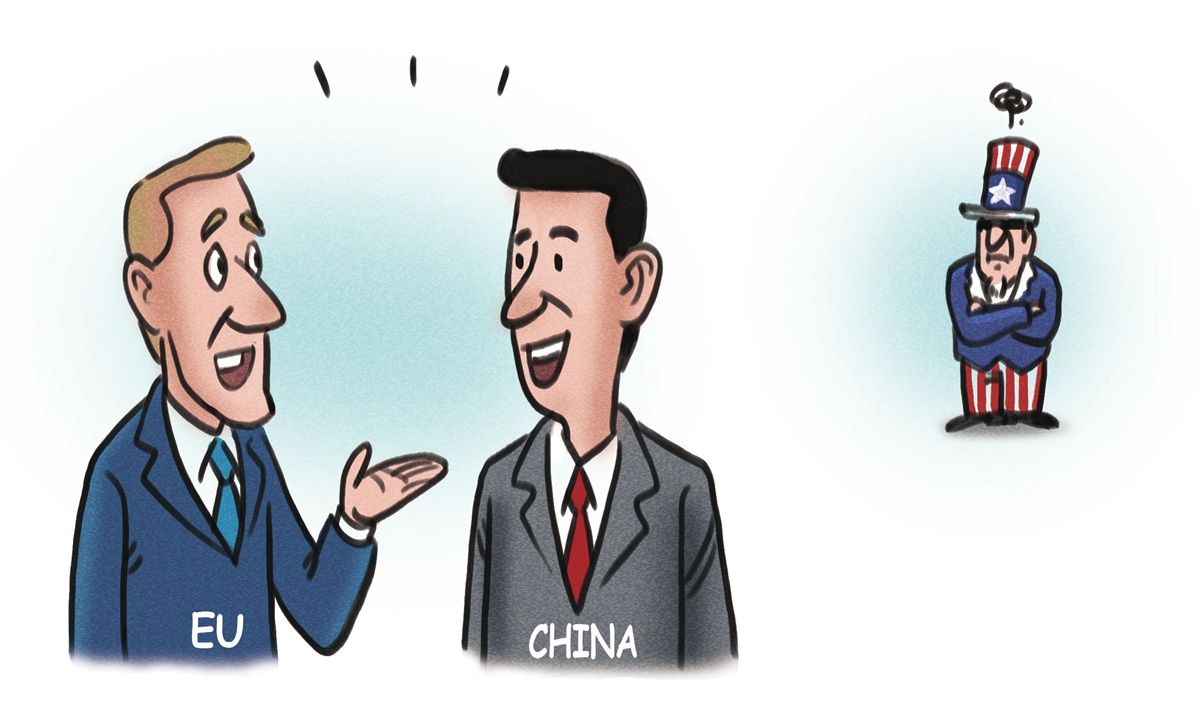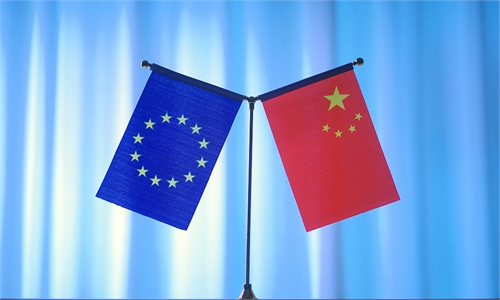
China-EU-US Illustration: Liu Rui/GT
China and the EU on Wednesday announced that the two sides have completed negotiations on a bilateral investment treaty as scheduled. The US has responded with a display of sour grapes.On Friday, the Washington Post published an editorial titled "China drives a wedge between Europe and the US." On the same day, an article by the Voice of America claimed that the EU-China investment deal threatens US-Europe relations, echoing the Post's tone.
The VOA piece said that independent analysts believe "Beijing has succeeded through the deal in driving a wedge between the US and Europe, just at a time when Biden is proclaiming his desire to rebuild America's traditional alliances on the continent."
The reason why Washington holds such a mentality is because it perceives global affairs as a zero-sum game, Cui Hongjian, director of the Department of European Studies at the China Institute of International Studies, told the Global Times on Sunday. Influenced by this mind-set, the US blindly claims that the completion of the negotiations will further destabilize US ties with the EU.
In other words, Washington believes that when Brussels moves closer to Beijing, it will alienate Washington.
Yet China has never driven a wedge between the US and Europe. China's deepening cooperation with the EU is driven by common economic interests. In contrast, a string of moves by the incumbent administration in the US over the past four years have gravely undermined the EU's interests.
Washington's selfishness, as well as its arbitrariness and suppression over Europe, have deeply irritated EU officials. The inevitable consequence is that Brussels' trust in Washington has significantly declined. The US should reflect on its practices and adjust its foreign policy, instead of passing the buck to China.
The White House will usher in new president Joe Biden on January 20. Even though it is widely expected relations between the US and Europe will be reset under a Biden administration, it remains to be seen how they will improve.
In the transatlantic alliance, Europe is not the equal of the US. In the eyes of analysts, the EU hopes to become a player in geopolitics, rather than a chess piece. It pursues an equal status with the US in the transatlantic relationship. Completing the negotiations with China on the investment agreement will undoubtedly increase its bargaining chips for potential talks with the US. It can help the EU gain an advantageous position in future negotiations with the Biden administration.
However, it does not mean the China-EU investment agreement negotiations were directed at the US. Against the backdrop of the US promoting its unilateralism and trade protectionism, the talks attempted to address bilateral concerns and bring more economic opportunities in a bid to achieve a win-win result.
Two of the US' other allies, Japan and South Korea, are pushing forward a trilateral free trade agreement with China. In fact, US allies are clearly aware that if they intend to further develop their economies, they cannot miss any opportunities to coordinate with China in terms of economy.
No matter how vigilant the US is against China and how much it persuades and pressures its allies not to coordinate with China, it will not prevent them from cooperating with China.



